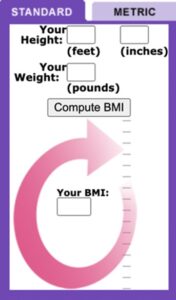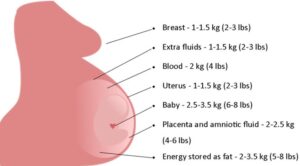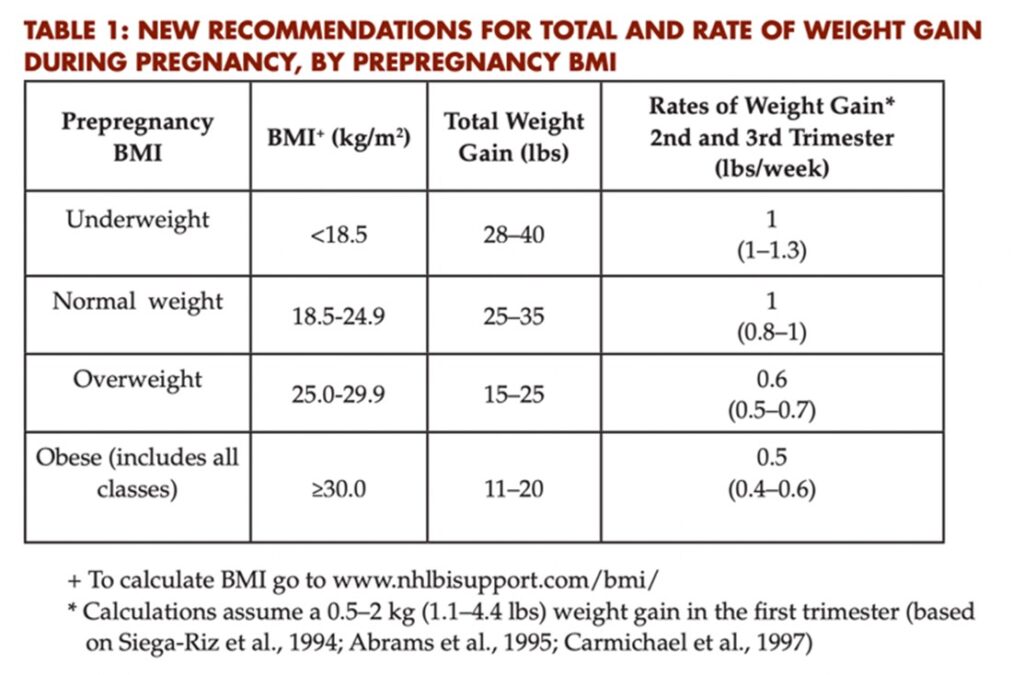How Much Weight Should You Gain And Why?
Author: Carolyn Curtis, MSN, CNM, RN, FACNM, FAAN
Editor: Dr. Steve Chaney
 Weight gain during pregnancy is a challenge for many women. The Centers for Disease Control has stated that 48% of women gained more than the recommended amount of weight during pregnancy, only one third (32%) of women gained the recommended amount and 21% of women gained too little[i]
Weight gain during pregnancy is a challenge for many women. The Centers for Disease Control has stated that 48% of women gained more than the recommended amount of weight during pregnancy, only one third (32%) of women gained the recommended amount and 21% of women gained too little[i]
Weight is a big thing to be concerned about and to work on prior to and during pregnancy. Why do you need to worry about this? One’s weight prior to pregnancy can make it more difficult to become pregnant. And weight gain during pregnancy carries lifelong implications for both the mother and infant.
Many women think that during pregnancy, that they must “Eat for Two”, thus giving them the feeling that they should eat more to nourish a developing baby. However, this saying needs to be re-examined, as I explain below.
Nutrition during pregnancy is really, really important. It lays down the physical foundation for your baby and has lifelong implications for both mother and baby. Keep in mind, you are growing a baby!
a baby!
So how much weight should I gain during pregnancy? Weight gain in pregnancy will be based upon your body mass index or BMI.
What is the body mass index? The Body mass index (BMI) is a measure of body fat based on height and weight that applies to adult men and women. A calculator is used to determine your BMI. [ii] Calculators to measure BMI can be downloaded from the Apple store and Google Play.
It is going to be the determining factor for how much weight you should gain during pregnancy.
So, Based On Your BMI, How Much Weight Should You Gain During Pregnancy?
The Institute of Medicine recommends that, based upon your pre-pregnancy BMI, weight gain during pregnancy can range from zero pounds up to 40 pounds during pregnancy.
- If you are underweight, weight gain between 28 and 40 pounds is recommended.
- If you are at normal weight, the recommended weight gain is between 25 to 35 pounds.
- If you are overweight, the recommended weight gain is 15 to 25 pounds.
- And if you are obese, the weight gain is 11 to 20 pounds during your pregnancy.[i]
Recent recommendations have proposed that obesity should be broken into three different categories. BMI 1, BMI 2 and BMI 3, and that total weight gain should be limited to zero to 15 pounds gain based on these BMI categories.[ii] Research is ongoing on these recommendations.
| Proposed Weight Gain Recommendations for Pregnant Women with Obesity† | ||
| BMI Category | Current IOM Recommendations (lbs) | Proposed Recommendations (lbs) |
| BMI 1 (30-34.9) | 11-20 | 5-15 |
| BMI 2 (35-39.9) | 11-20 | <10 |
| BMI 3 (≥ 40) | 11-20 | Maintain prepregnancy weight |
J. Clin. Invest. 2019 129: 4567-4569
Where Does The Weight Go During Pregnancy?
Your baby and changes in your body during pregnancy account for the 25 to 35 pounds weight gain during  pregnancy.
pregnancy.
- Baby – 6-8 pounds.
- Placenta and surrounding water – 4-6 pounds.
- Uterus – 2-3 pounds.
- Enlarged breast tissue – 2-3 pounds.
- Increased blood (blood volume increases 40% to 50% during pregnancy) – 4 pounds.
- Fluids in the maternal tissue throughout your body – 2-3 pounds.
- Fat stores – 5-8 pounds.
How Many Calories Should You Eat Each Day?
 During the first trimester, it is recommended that women gain no more than four pounds. In the second and third trimesters of pregnancy, it is recommended that women should gain between one half pound to one pound per week[i].
During the first trimester, it is recommended that women gain no more than four pounds. In the second and third trimesters of pregnancy, it is recommended that women should gain between one half pound to one pound per week[i].
One pound is equal to 3,500 calories. This equals to 500 calories per day which is equal to a sandwich and a glass of milk. This is definitely not “eating for two”. If you are carrying twins or triplets, this amount will increase.
What Happens If You Are Underweight Or Overweight?
Implications for mother and baby are as follows:
Overweight[i]
Mother:
- May take longer to get pregnant.
- Increased risk of miscarriage
- Increased risk of developing pre-eclampsia.
- Increased risk of diabetes.
- Having a longer labor which can result in postpartum hemorrhage.
- Increased possibility of needing to use internal monitors as external monitors cannot pick up fetal heart tone due to fat density.
- Increased risk of cesarean section.
- Increased risk of shoulder dystocia because the baby is also big.
- Weight stays on after pregnancy, which increases the risk of overweight and obesity.
- Increased risk of developing diabetes later in life.
- Increased risk of repeat cesarean section.
Baby:
- Increased risk of neural tube defects.
- Increased risk of heart defects.
- Baby is too big for weeks of pregnancy (gestational age baby).
- Hyperglycemia, meaning that the baby’s blood sugar is too high.
- Possibility of trauma when the baby is being born.
- Long-term obesity for that child resulting in childhood obesity.
- Daughters that are large for gestational age are more likely to be obese and deliver larger babies.
Underweight
Mother:
- Difficulty with getting pregnant.
- Increased risk of having a pre-term birth (your baby is born before 37 weeks of pregnancy).
Baby:
- Increased risk for prematurity.
- Increased risk that baby is small for gestational age or low birth weight.
- Problems with oxygen levels at birth.
- Trouble staying warm because the baby doesn’t have the fat stores that give the calories to help the baby to stay warm.
- Breathing problems.
- Increased problems with infection.
- Nervous system problems with possible long-term effects of cerebral palsy, blindness, developmental delays where your baby is not developing on time.
What Resources Are Available To Help You Gain The Appropriate Amount Of Weight During Pregnancy?
There are many resources available, including weight gain trackers.[i] It would be wise to seek the help of a registered dietitian. If you are underweight or obese, their services may be covered under your health insurance.
The Bottom Line
- Women who are overweight or underweight prior to pregnancy can have difficulty becoming pregnant.
- Many women carry the idea that during pregnancy, that they are “Eating for Two”. This idea can lead to excessive weight gain for the mother that persists after pregnancy and childhood obesity for the infant.
- Weight gain during pregnancy is determined by one’s pre-pregnancy body mass index (BMI).
- Based upon the prepregnant BMI, weight gain during pregnancy can range from 11 pounds to 40 pounds during pregnancy. Ongoing studies are suggesting a weight gain amount of zero to 15 pounds for Obesity Categories I through III.
- It is recommended that during pregnancy, mothers gain up to a total of four pounds in the first trimester and between one half to one pound per week in the second and third trimesters. This amount of weight gain equals to an additional 500 calories per day which is equal to a sandwich and one glass of whole milk additionally per day.
- Weight gain during pregnancy carries lifelong implications for both mother and infant.
- Seek help from a registered dietitian if you are overweight or underweight. Weight gain trackers are also available for mothers to track their weight during pregnancy at the Centers for Disease Control website.[ii]
[1] https://www.cdc.gov/reproductivehealth/maternalinfanthealth/pregnancy-weight-gain.htm
[1] https://www.nhlbi.nih.gov/health/educational/lose_wt/BMI/bmicalc.htm
[1] https://nap.nationalacademies.org/resource/12584/Resource-Page—Weight-Gain-During-Pregnancy.pdf
[1] https://www.acog.org/clinical/clinical-guidance/committee-opinion/articles/2013/01/weight-gain-during-pregnancy
[1] https://nap.nationalacademies.org/resource/12584/Resource-Page—Weight-Gain-During-Pregnancy.pdf
[1] https://www.womenshealth.gov/healthy-weight/weight-fertility-and-pregnancy
[1] https://www.cdc.gov/reproductivehealth/maternalinfanthealth/pregnancy-weight-gain.htm
[1] Ibid
[i] https://www.cdc.gov/reproductivehealth/maternalinfanthealth/pregnancy-weight-gain.htm
[ii] Ibid
Visit My You Tube Channel
For more information on how to have a healthy pregnancy and healthy child, especially if you are black, visit my You Tube Channel.
https://www.youtube.com/@carolyncurtis-thecarabcompany
Carolyn Curtis
These statements have not been evaluated by the Food and Drug Administration. This information is not intended to diagnose, treat, cure, or prevent any disease.
About The Author
Carolyn Curtis, MSN, CNM, RN, FACNM, FAAN, has:
- More than 40 years’ experience in the oversight of domestic and international programs and the provision of nursing and midwifery integrated service delivery in maternal child health, family planning, reproductive and women’s health care.
- Twenty years’ experience in teaching, mentoring, and providing clinical oversight to undergraduate and graduate public health, medical, nursing and midwifery students.

